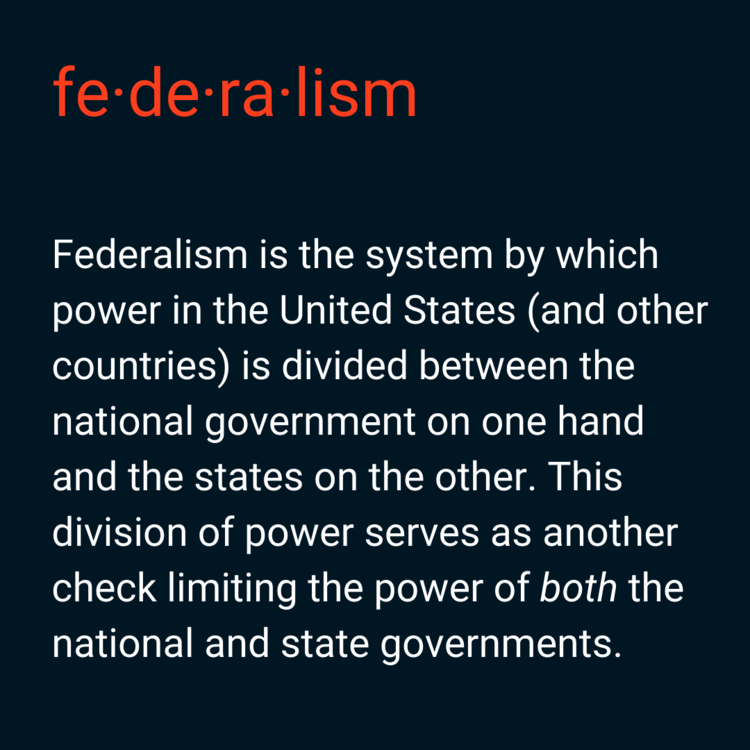In Federalist #39, James Madison explained that the new federal government would only have the powers delegated to it, saying that “its jurisdiction extends to certain enumerated objects only.” Meanwhile, the states would retain ALL other powers, keeping “a residuary and inviolable sovereignty over all other objects.” Madison was responding to the states’ rights concerns of those opposed to ratifying the Constitution. Indeed, our founders believed that this system of dual sovereignty or shared governance was crucial to protecting the people from the tyranny of unchecked power at the national level.
Our system of federalism is unique because although the federal government has considerable power– it can print money, regulate interstate commerce, and declare war, for example–the powers delegated to the federal government and listed under Article I Section 8 of the US Constitution are actually quite few in number. And in our country, many of the most important powers of government are shared with the states (i.e. taxation) or reserved exclusively to them (i.e. enforcing order within their territory). What’s more, the vast majority of laws in this country are passed at the state and local level.
The United States has lived under this system, to varying degrees, since the ratification of the Constitution, so it’s hard to imagine a world without it. But try and imagine what today’s America would look like if our founders hadn’t balanced states’ rights with the power of the national government. And try to imagine how we would exercise our rights and duties as citizens if the relationship between the federal government and the states were fundamentally altered in favor of the former.
Imagine you’re a public school teacher in a mid-sized town, near College Station, Texas. Over the course of your career, the national government’s record on education has been adequate. Some administrations have worked with Congress to make funding cuts and even lower teacher standards. But all in all, your school district has been served OK. However, the recent Congress just passed a piece of legislation that nationalized the curriculum, a decision that spells disaster for your school. Indeed, many of your students hope to matriculate at Texas A&M, and the new curriculum includes nothing about agriculture. You grow increasingly frustrated and angry as the students in your school fail to receive the education they deserve and need for their futures.
And your concerns over your school go far beyond learning in the classroom. Congress also recently passed a law that requires teachers at public schools to aid federal agents investigating students who might be in the country illegally. You understand the importance of legal immigration; we are a nation of laws, after all. But you have been put into the untenable position of either helping to deport your students (who through no fault of their own came here illegally) or being in violation of federal law.
Your job as an educator has become extremely difficult. And what’s worse, you feel that you have no recourse to effect change. Indeed, what change could you possibly make as just one citizen out of more than 300 million? How can you personally change the direction of Congress’ education policy? And how can you stand up to the overbearing weight of federal officials?

Now, thankfully, this scenario isn’t our reality. First of all, education is NOT one of the powers listed under Article I Section 8 of the Constitution; it is a power reserved to the states. Consequently, the federal government cannot mandate a national curriculum. The teacher in the above example WOULD have had recourse to change the curriculum at her school, if she found it wanting. She could have appealed to her local school board of education where much of the education policy in the states is worked out and which would likely have been far more responsive than Congress. She could even have gotten involved at the state level as an activist and through lobbying state officials. Indeed, despite the dysfunction of our Congress, this month, Maryland passed the most significant educational reform bill by any state in a decade, setting out a decade-long plan to increase funding to disadvantaged schools, raise teacher pay, improve standards, and add more programs to ready students for life after graduation.
Second, under the Constitution, establishing national immigration policies is the responsibility of the federal government. But a necessary consequence of this is that the states do NOT have an obligation to assist the federal government in implementing or enforcing those policies. As a result, the teacher would NOT have had to assist federal agents investigating her students. This has nothing to do with the ethics or morality of the individual policy and everything to do with the nature of the states as sovereign entities under our system of federalism. Stated another way, state or local officials cannot be commandeered by the federal government.
In a country as vast, populous, and diverse as the USA, federalism provides the flexibility and varied avenues for political engagement necessary to continue our nation’s experiment in liberty. It is a core protection against the dysfunction, corruption, and even authoritarianism at the national level. And to borrow the phrase of Justice Louis Brandeis, it allows states to act as “laboratories of democracy.” Indeed, innovative legislation, once it has succeeded in one state, can inspire similar legislation in other states as well as in the federal government. This can be true, even during periods of great crisis, where mayors and governors across the country step up to provide the leadership and guidance that we all need, helping to fight a disease or conducting elections in unprecedented circumstances. For this, we can thank our founders for fashioning our nation under the system of federalism.




